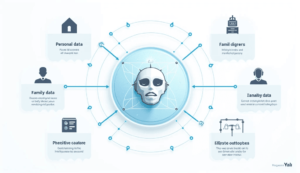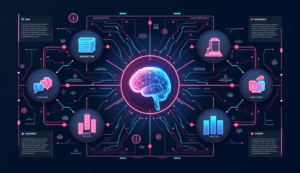In today’s rapidly evolving digital age, a revolutionary online service is capturing the attention of curious minds worldwide. The AI death calculator is a unique platform that promises to blend cutting-edge predictive analysis with everyday health insights. By leveraging advanced AI technology and a robust machine learning model, this service seeks to estimate a user’s death date while taking into account numerous variables that shape life outcomes. In this article, readers will discover how this innovative tool operates, the role of Death Prediction AI in transforming our understanding of human lives, and why the power of artificial intelligence is opening new frontiers in forecasting life trajectories.
The service works by analyzing an individual’s data, including family history, medical history, and even subtle details like date of birth and daily calorie intake. It integrates information about life events, lifestyle choices, and health habits to provide lifespan estimates that might help users understand the predictability of human lives better. At the same time, the concept might sound like science fiction. Still, experts from institutions like the Technical University of Denmark and researchers such as Sune Lehmann have contributed to refining the underlying AI algorithms. These tools do not merely compute an arbitrary death date; they offer an engaging interface where users can explore how various factors affect their overall health and future.
Urgent Warning: Readers should always exercise caution and remember that the results from such services are estimates based on minute health data.
Urgent Warning: It is essential to verify the source and credibility of such predictions to avoid any misleading interpretations.
Urgent Warning: Beware of a fraudulent website imitating legitimate platforms.
It is an innovative play on an AI calculator, not a real prediction of death.
What Is an AI Death Calculator?

An AI death calculator is a sophisticated online tool that uses AI algorithms to predict the time of death based on a user’s medical history, family history, and other significant life events. This AI tool utilizes a database of extensive medical data and statistical analysis to compute an estimated lifespan range. While the concept may raise eyebrows, the calculator is designed to stimulate thought about proactive health choices and to encourage users to consider the impact of their lifestyle choices on health outcomes.
How It Works
The service collects personal information such as a user’s date of birth, health habits, and even subtle inputs like daily calorie intake and physical activity. Once the data is submitted, the system processes the inputs using a machine learning model that has been trained on a vast amount of global health records. By analyzing sequences of life events and correlating them with health conditions, the system produces an estimated lifespan range that, although not absolute, provides insight into the predictability of human lives.
This innovative approach has gained attention, partly because it emphasizes that Death Prediction AI is not meant to be a definitive forecast but rather a tool for reflection and motivation towards positive changes. It is a modern twist on traditional life expectancy models, offering personalized insights that can inspire users to adopt better habits and seek professional health advice when needed.
The Science Behind the Predictions
At the heart of this service lies the power of artificial intelligence, which processes and interprets diverse sets of data to offer users personalized lifespan predictions. The calculator’s backend is powered by a machine learning model that incorporates a wide array of inputs—ranging from personal data about life events to medical records—and processes them in a natural language that is both accessible and informative.
Data Sources and Methodology
The tool aggregates data from multiple trusted sources. For instance, statistics provided by Statistics Denmark and research outputs from the Technical University of Denmark help validate the algorithms. Users’ medical history and detailed records of health conditions are integrated with data on smoking habits, balanced diet, and physical activity. In this process, even minor details like minute health data play a significant role in refining the final prediction.
Moreover, the calculator considers family history and sequences of life events—two critical components that determine life outcomes. In doing so, it provides a comprehensive look into the predictability of human lives, urging users to reflect on the broader implications of their lifestyle choices. Researchers have also emphasized that the tool is not a replacement for professional medical consultation; rather, it serves as a conversation starter about health and longevity.
How Does the AI Tool for Predicting Death Work?

The underlying mechanism of the death calculator is both complex and fascinating. This AI tool harnesses the capabilities of a state-of-the-art machine learning model to sift through extensive medical data and output lifespan estimates.
Key Components
- Data Input: Users provide a range of details, including their date of birth, health habits, smoking habits, and even data points like daily calorie intake. This input is securely stored, ensuring that personal data remains confidential. Some platforms may even require an email address or phone number for account verification, though stringent privacy measures are in place.
- Algorithmic Processing: The system employs AI algorithms that have been fine-tuned to analyze various factors such as life events, lifestyle choices, and health conditions. Through this process, the calculator identifies patterns and correlations that lead to an accurate prediction of life trajectories and the potential death date.
- Output and Interpretation: Once the data is processed, the tool provides lifespan estimates and additional insights. For instance, it may compare the input data against a baseline derived from populations in the United States or other regions. The output is communicated in clear, natural language, making it easier for users to understand their personal life trajectories. Additionally, platforms like AI Death Calculator – Life2Vec showcase how Death Prediction AI can deliver personalized predictions with a user-friendly interface.
Additional Features
Some versions of the tool also incorporate an AI chatbot that interacts with users to explain the prediction results. By using conversational cues, the chatbot can clarify how sequences of life events contribute to the overall prediction. This interactive experience enhances understanding and encourages users to take the results seriously, promoting positive changes in their daily routines.
Pricing & Accessibility: Is Death Clock AI Free?
One of the most frequently asked questions is whether these predictive tools are accessible without charge. Many platforms claim to be an AI death calculator free option, making the service widely accessible to curious users. However, while a free version often exists, additional features may be locked behind a premium subscription.
Free vs. Premium Services
- Free Version: Users can access a basic version of the service that provides standard Death Prediction AI results. The free version offers insights based on a limited set of extensive medical data and general life trajectories. This version is ideal for users who want to experiment with the tool without providing too much personal data.
- Premium Features: For a more detailed analysis, some platforms offer premium packages. These might include more personalized reports that incorporate detailed medical history, health conditions, and even a review of social media accounts to better gauge health habits. Premium users might also receive tailored health advice that considers their unique lifestyle choices and other subtle cues, such as physical activity levels.
Security and Privacy
Reputable platforms are transparent about how they handle personal information. They ensure that data such as family history and medical history is stored securely and is never shared with insurance companies or third parties without explicit consent. It is also common for such websites to provide an urgent warning against sharing sensitive details on public forums, thus safeguarding users from potential misuse.
Mobile Platforms: Is There an App That Calculates Death?

With the growing reliance on mobile devices, many users wonder if there is an app version of the death calculator available on the App Store. The answer is yes—several developers have created mobile-friendly versions that offer the same predictive insights on the go.
Features of the Mobile App
The mobile app version of the calculator is designed to deliver a seamless experience with features that mirror the desktop version. Key benefits include:
- Real-time Health Sync: Users can sync their latest health data for more accurate predictions.
- User-Friendly Interface: The app uses natural language to explain results and guide users through the process.
- Integration with Wearables: Data from fitness trackers (e.g., physical activity and daily calorie intake) can be integrated for enhanced accuracy.
- Secure Data Handling: The app ensures that all personal data is encrypted and stored safely, minimizing any risk associated with sharing phone numbers or email addresses.
This mobile accessibility makes it easier for users to update their medical history and health habits as their life events evolve, ensuring that the predictions remain current and relevant.
Frequently Asked Questions
How Accurate Is the Prediction?
While the calculator provides an engaging look into one’s life trajectories, it is important to note that no prediction is definitive. The tool uses a sophisticated machine learning model to deliver lifespan estimates that should be seen as indicative rather than absolute. By analyzing minute health data and multiple life events, the system generates insights that encourage users to improve their overall health.
Can Lifestyle Changes Affect the Outcome?
Absolutely. The predictions offered by Death Prediction AI are dynamic. For instance, improvements in health habits—such as adopting a balanced diet, increasing physical activity, and quitting detrimental behaviors like poor smoking habits—can lead to better predictions over time. This is a call for individuals to make proactive health choices that can positively influence their future.
What Kind of Data Is Required?
The tool requires basic inputs such as date of birth, medical history, and a few details about current health conditions. Additionally, it factors in lifestyle choices and everyday life events. Information regarding family history is also essential, as it helps the system establish a more personalized estimated lifespan range.
Is There a Risk of Data Misuse?
Users should remain vigilant and ensure that they use a reputable service. Before submitting any personal data, it is advisable to verify that the platform is secure and not a fraudulent website. Trusted sites provide clear information on data handling practices and have robust privacy policies in place.
How Do Social Factors Influence the Results?
The tool even considers non-medical inputs such as social media accounts to gauge social behaviors that might indirectly affect mental health and overall health. In some cases, data about leadership roles or higher income might be used to infer certain lifestyle patterns. However, the core analysis remains focused on tangible health conditions and medical history.
Real-world applications and User Testimonials
Many individuals have found the insights provided by this predictive tool to be both thought-provoking and motivational. While some use it as a novelty, others see it as a catalyst for making significant proactive health choices. For example, a user who received a lower-than-expected Death Prediction AI estimate decided to overhaul their balanced diet and physical activity regimen, leading to noticeable improvements in health outcomes over time.
Case Studies
- Case Study 1: A middle-aged professional in the United States used the calculator to evaluate his life trajectories. After providing details such as date of birth, medical history, and daily calorie intake, he received a comprehensive report. The insights prompted him to improve his health habits and engage in regular exercise, underscoring how Death Prediction AI can inspire positive changes.
- Case Study 2: Another user, keen to learn more about her life outcomes, explored the app version available on the App Store. By integrating data from her wearable device through Real-time Health Sync, she was able to track improvements in her physical activity and health conditions. The app also reminded her to update her personal information periodically, ensuring that her predictions remained as accurate as possible.
Testimonials from various users highlight that while the tool’s accuracy may vary due to the complexity of various factors, its greatest value lies in motivating individuals to reconsider their lifestyle choices and adopt healthier practices.
Ethical Considerations and Limitations
Despite its innovative approach, the death calculator raises important ethical questions. Critics point out that predicting the time of death based on extensive medical data might inadvertently create anxiety among users. Therefore, it is crucial to approach the results with a balanced perspective.
Key Ethical Points
- Privacy: The system ensures that all personal data—ranging from family history to details about health conditions—is handled with the utmost confidentiality. Reputable platforms never share sensitive data like email addresses or phone numbers with insurance companies or other third parties.
- Interpretation of Results: Users are encouraged to view the predictions as one of many tools available to understand health outcomes. Professional health advice should always be sought when making decisions about one’s well-being.
- Limitations: While the calculator uses a robust machine learning model to process inputs, its predictions are inherently statistical estimates. Factors such as mental health and unpredictable life events can alter the actual life trajectories in ways that no algorithm can fully anticipate.
The Future of Death Prediction AI
Looking ahead, the intersection of AI technology and healthcare promises exciting developments. As data from more diverse sources—including insights from social media accounts and real-time updates from devices—becomes available, the accuracy of Death Prediction AI is likely to improve. Researchers at institutions like the Technical University of Denmark are already exploring ways to refine these predictions further, and experts such as Sune Lehmann are leading the charge in this innovative field.
The continuous evolution of AI Death Calculator Works demonstrates that while the current predictions serve as a guide, future iterations may offer even more personalized insights by factoring in minute health data and dynamic sequences of life events. Such progress could empower individuals to make more informed, proactive health choices that ultimately influence their life outcomes.
Conclusion
In summary, the AI death calculator offers a fascinating glimpse into how modern AI technology is being used to estimate lifespan estimates. By integrating personal data such as family history, medical history, and everyday life events, the tool provides a unique perspective on the predictability of human lives. While its predictions—rooted in advanced Death Prediction AI—are not absolute, they encourage users to consider their health habits, lifestyle choices, and overall health conditions in a new light.
For those intrigued by this blend of technology and personal insight, the platform serves as both an engaging conversation starter and a motivator for positive changes. Whether accessed via the desktop or on the App Store as a mobile application, users are reminded to verify their details and avoid sharing sensitive information with a fraudulent website.
Ultimately, the death calculator is more than just a prediction tool—it is a catalyst for reflection and action. By understanding how various factors such as daily calorie intake, smoking habits, and even subtle aspects like physical activity impact health outcomes, individuals are empowered to embrace proactive health choices.
As the boundaries of AI Death Calculator – Life2Vec and similar platforms continue to expand, it is clear that the power of artificial intelligence can significantly influence people’s lives. Those interested in learning more or experiencing the tool firsthand should consider exploring it—always with an urgent warning to balance the insights with professional health advice.



